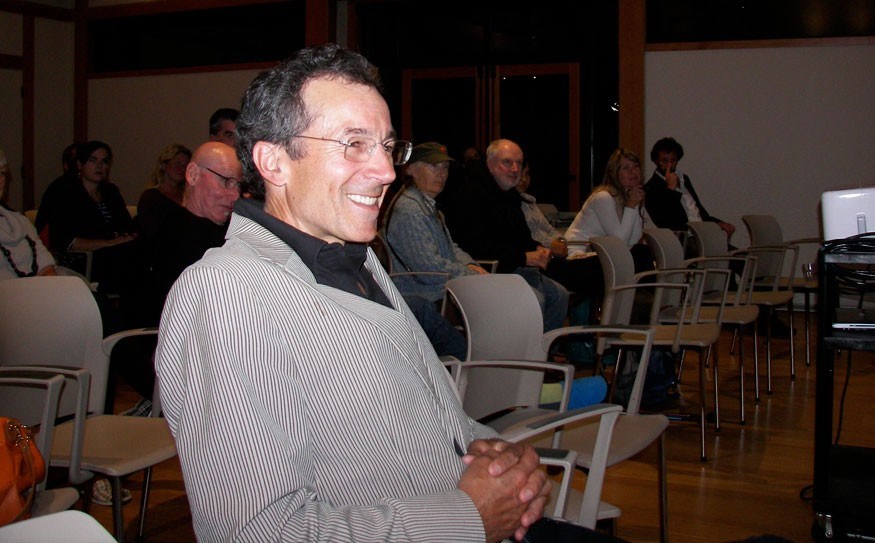Ralph Forsyth didn't attend Peter Ladner's presentation on urban food at the Brew Creek Centre last week but he certainly had a presence.
Ladner, the author of The Urban Food Revolution: Changing the Way We Feed Cities, shared his ideas of how locally produced food makes people healthier, alleviates poverty and creates jobs while making cities safer and more beautiful.
Pique recently published a feature article Forsyth wrote in which he argues the world needs big agriculture companies and small-scale local farming isn't all that the boosters claim it is. (Pique Sept.6, 2012)
While some at the Ladner event scoffed at the mention of Forsyth's article it is clear that while Ladner and Forsyth have some distinct philosophical differences they also have some key opinions in common.
In advance of Ladner's presentation at the Brew Creek Centre on Oct. 9, Ladner said small-scale local farming isn't the answer to food supply challenges. He opined that food importation is impossible to avoid. Ladner and Forsyth both completely agree on this.
A panel made up of three people led a discussion following Ladner's presentation at Brew Creek. The panel was made up of Chris Quinlan, Patricia Heintzman and Jordan Sturdy.
Quinlan, a former Whistler Council member and manager of the Whistler Farmers' Market, agrees with most of Ladner's ideals. Current Squamish Councillor Heintzman is also on side with Ladner.
Sturdy, the current Pemberton mayor and owner/operator of North Arm Farm, has many thoughts on Ladner's presentation to the audience of about 25 people.
Ladner supports the SOLEfood social enterprise farming initiative in Vancouver that employs East End residents. Initiatives like SOLEfood rile Sturdy up.
"As a grower we're under tremendous pressure," Sturdy tells the small gathering. "We're in a global food system. In B.C. here we have some of the highest land costs anywhere. We have some of the highest labour costs anywhere. All our input costs are high.
"I compete with people that grow three crops in a year and I'm lucky to get one sometimes."
Sturdy notes that food prices are being pushed down on many fronts by various influences.
"In this country, I look at these initiatives, I look at some guy putting a million dollars into a parking lot so they can put boxes on it so they can have a bunch of people work for nothing... and drive the price down. Ultimately it is competing with me and I am trying to pay a mortgage and I am trying to pay a staff that I have to essentially pay $15 an hour plus all their other costs. I barely make a living and this stuff directly competes with what I'm producing."
While Sturdy and other farmers like him face the full cost of a farming operation, Ladner agrees that food subsidies exist in abundance.
"If we're going to feed ourselves with a different, more resilient, somewhat more local sources everything has to be on a more economically stable footing, most especially real farmers who are producing the bulk of the food we eat," says Ladner in response to Sturdy's dose of farmer reality. "I talk a little about that in the book and I looked into every one of these experiments and tried to get the economic model to add up and in many cases it doesn't."
Ladner worries that if local farmers can't operate with stability then they will bow out and the larger food producers will get even bigger, leading to a situation where our region is completely dependent on large suppliers.
"Our reliance on industrial agriculture has resulted in a food supply riddled with hidden environmental, economic and health care costs and beset by rising food prices," argues Ladner. "With only a handful of corporations responsible for the lion's share of the food on our supermarket shelves, we are incredibly vulnerable to supply chain disruption."
Forsyth's defense of "big ag" doesn't sit well with the anti-GMO set but Ladner makes it clear that the food issues our world faces won't be saved by converting household lawns into vegetable garden patches. For 35 years Ladner has been producing vegetables at his Vancouver home and he knows well that his yard will never sustain his food needs. He and Forsyth agree that the 100-mile diet is nothing more than an unsustainable novelty.
Here's another thing Ladner and Forsyth agree on: "big ag" isn't all evil and bad.
On this point, Quinlan jumps in and suggests one of the real values of locally produced food is the education benefits it offers.
"It is about the recognition and the awareness people have about that food," says Quinlan.
He encourages consumers to buy raw ingredients, the food that is found at farmers' markets or the outer walls of the grocery store, and convert those foods into meals instead of buying pre-produced consumables in grocery store aisles.
Simplified, grapes from Argentina are better for everyone than bottles of cola produced in Vancouver.




